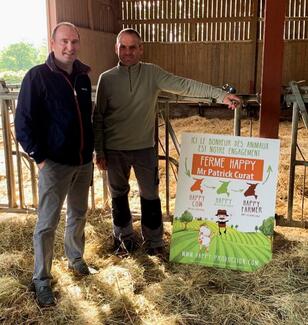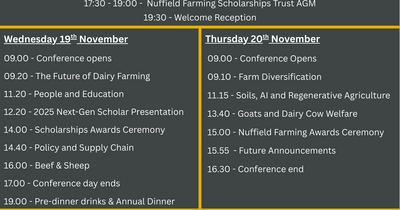
Veterinary Surgeon and Trouw Nutrition Ireland Technical Manager Mark Little NSch 2019 has published his Nuffield Farming report titled ‘Feeding for Heath – Combating Antimicrobial Resistance’, sponsored by The Thomas Henry Foundation.
“As healthy animals do not need antibiotic treatment, keeping them healthy is an important strategy to prevent the development of antibiotic resistance,” Mark explains. “It is important to consider cattle health as an interconnected relationship between genetics, farm management, vaccination and nutrition and to take a holistic view to choose the area to make the most difference on-farm.”
Mark outlines several nutritional products such as probiotics, prebiotics, essential oils, plant extracts, plant fibres, and quorum sensing which can support herd health by helping cattle resist bacterial challenges that would normally cause disease. However, he highlights that none of the currently provide a ‘silver bullet’ solution and they should never be used as a substitute for good management.
“These products should not be considered as a replacement for antibiotics and a good nutritionist can help with recommendations on how to place them to achieve the best on-farm results. If these products are used on the correct farm and at the correct time, particularly on farms already good at herd management, they can result in herd health benefits. Although this is an investment in the herd, there is growing consumer interest in purchasing food products that are from high health herds.
Mark calls for further research and investment into these solutions; “it is important to continue to improve nutritional solutions to increase cattle health as in the future. Antibiotics may not always be so cost effective, and in the future, we may need alternative options,” concludes Mark.
Mark was one of the first Scholars to have his report accredited by the Institute of Biology, Environmental and Rural Sciences (IBERS), part of Aberystwyth University.
The report is now available on the Nuffield Farming website at www.nuffieldscholar.org/reports or can be downloaded directly at bit.ly/34LzySz.
Mark also presented his findings during the recent Nuffield Farming Virtual Mini-Conference Series. His presentation can be seen on Nuffield Farming’s YouTube channel at bit.ly/34LoCnV.
Study Objectives
- To find out more about the nutritional solutions to increase animal health
- To investigate how ensuring animal health will reduce antibiotic usage
Countries Visited
France, Norway, The Netherlands, The USA, UK, Spain and Switzerland
Messages
- We should not concentrate on nutritional solutions to simply replace antibiotics, many increase cattle immunity and health and therefore make them less likely to need antibiotics.
- Probiotics, prebiotics, essential oils, plant extracts, plant fibres, bacteriophages and using the quorum sensing theory have potential positive effects on cattle health however, none of these are a ‘silver bullet’ solution.
- Many of the nutritional solutions are not as effective nor as cost effective compared to antibiotics. This means that it is difficult to secure the investment needed to improve, refine and optimise their function in cattle.
- Animal health is an interconnected relationship between genetics, farm management, vaccination and nutrition and a holistic view must be taken to pick the area to make the most difference on-farm.
- I feel positive for the future as there are many different companies working on nutritional solutions to improve animal health. We are not there just yet, but the momentum of work is increasing, and solutions will come.



